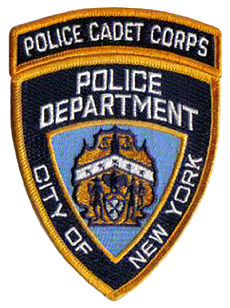
NYC police cadet corps
Encyclopedia

New York City Police Department
The New York City Police Department , established in 1845, is currently the largest municipal police force in the United States, with primary responsibilities in law enforcement and investigation within the five boroughs of New York City...
. The program is open to New York City residents who are enrolled in college and have completed 45 credits
Credit (education)
A course credit is a unit that gives weighting to the value, level or time requirements of an academic course taken at a school or other educational institution.- United States :...
or people who dorm at college within the five boroughs and have completed 45 credits
Credit (education)
A course credit is a unit that gives weighting to the value, level or time requirements of an academic course taken at a school or other educational institution.- United States :...
. People who have not yet completed the 45 credit requirement are able to join under certain circumstances.
Cadets are trained by police academy
Police academy
A police academy is a training school for new police recruits, also known as a law enforcement academy.-Australia:Larger police departments usually run their own academies. States often run a centralised academy for training of personnel of law enforcement agencies within the state.Police...
instructors and then placed into a command such as a precinct or specialized unit. They are trained in law
Law
Law is a system of rules and guidelines which are enforced through social institutions to govern behavior, wherever possible. It shapes politics, economics and society in numerous ways and serves as a social mediator of relations between people. Contract law regulates everything from buying a bus...
, police science
Police science
Police science is often an ambiguous term that denotes the studies and research which directly or indirectly deal with police work. Studies and research in criminology, forensic science, psychology, jurisprudence, community policing, criminal justice, correctional administration and penology all...
, and behavioral science
Behavioural sciences
The term behavioural sciences encompasses all the disciplines that explore the activities of and interactions among organisms in the natural world. It involves the systematic analysis and investigation of human and animal behaviour through controlled and naturalistic observation, and disciplined...
. They are also put through a very similar but shorter physical training course that a recruit in a police academy
Police academy
A police academy is a training school for new police recruits, also known as a law enforcement academy.-Australia:Larger police departments usually run their own academies. States often run a centralised academy for training of personnel of law enforcement agencies within the state.Police...
would have to take.
Cadets receive a $14.16 hourly wage, a flexible work schedule during the school year, full time summer employment, and are eligible to claim up to $20,000 in tuition assistance annually. If cadets are promoted to the rank of police officer, after two years of service as a police officer, this tuition assistance is written off and considered repaid or "paid in full".
In December 2008, a budget plan proposed by City Council
New York City Council
The New York City Council is the lawmaking body of the City of New York. It has 51 members from 51 council districts throughout the five boroughs. The Council serves as a check against the mayor in a "strong" mayor-council government model. The council monitors performance of city agencies and...
Speaker Christine Quinn would have eliminated the Cadet Corps for a savings of $1.3 million. However, this never occurred.
See also
- List of law enforcement agencies in New York
- New York City Police DepartmentNew York City Police DepartmentThe New York City Police Department , established in 1845, is currently the largest municipal police force in the United States, with primary responsibilities in law enforcement and investigation within the five boroughs of New York City...
- New York City Police Department Highway PatrolNew York City Police Department Highway PatrolThe New York City Police Department Highway Patrol, also known as the NYPD Highway Patrol or by the shorthand NYPD HWY, is a specialized unit under the auspices of the NYPD's Transportation Bureau primarily responsible for patrolling and maintaining traffic safety on limited-access highways within...
- New York City Police Department Auxiliary Police
- New York City Police CommissionerNew York City Police CommissionerThe New York City Police Commissioner is the head of the New York City Police Department, appointed by the Mayor of New York City. Governor Theodore Roosevelt, in one of his final acts before becoming Vice President of the United States in March 1901, signed legislation replacing the Police Board...

